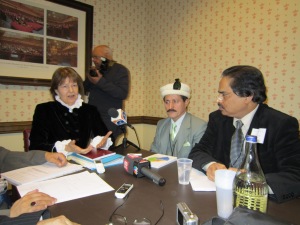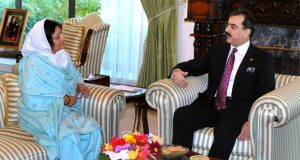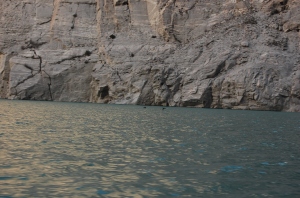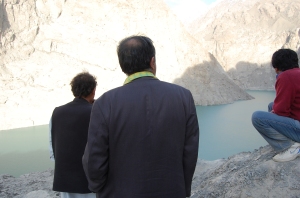Archive
Governor Dr. Shama Khalid’s first visit to Gilgit-Baltistan
(Gilgit) April 13: According to reliable news sources Dr Shama Khalid,the first governor of Gilgit-Baltistan has arrived the capital city Gilgit on her first ever official visit to the newly created ‘’provincial unit’’.
On arrival at the airport she was received by Chief Minister Gilgit-Baltistan Syed Mehdi Shah who was accompanied by Chief Secretary and other high government officials. Dr Shama will hold public meetings in various districts including the Hunza-Nagar district where a major natural disasters has killed more than fifteen people and displaced hundreds of others.
Dr Shama who was born in Astore but was married off to a doctor in Abbotabad, was appointed the first governor of Gilgit-Baltistan after the introduction of a long-due legal empowerment package that created structures of governance similar to those practised in the other four provinces of Pakistan. It may be noted that the announcement of of the appointment of a female governor was made by Pakistani president Asif Zardari in an unscripted public speech in Larkana Sindh.This public announcement subsequently became policy and the search began for appropriate candidates. Negotiations were held and offers were made to a number of PPP female politicians including Ms Sanama Bhutto and Sherry Rahman belonging to various part of Pakistan and nobody was really willing to take up the challenge of the job and thus it was decided to choose a so called ”local” or someone from the region itself and hence the appointment of Dr Shama Khalid.
(VIEW) Irony! Battle of man with Nature
Attabad: Hunza Life is full of ironies. The devastating landslide that blocked Hunza river on January 4 2010 has now slowly grown into a stunningly beautiful lake.
Already sea birds have started hovering over the lake-water, and some people visit the site just for fun as well. The landslide killed at least 15 people and has slowly displacing many more in the wake of its expansion, submerging Karakorum Highway, engulfing the precious agricultural land, thus creating an unprecedented crises in Hunza. Yet there are ways to convert a crises into an opportunity, and man has always struggled with Nature to convert its challenges into opportunities for human progress and advancement. As a matter of fact, dam construction is a costly, and time-consuming activity. It requires years of planning, allocation of budgets and resources and above all it requires political will to take the initiative and begin the process of construction and development. This natural dam has solved all the problems at once, and this natural dame cum lake can be preserved..But again it will require a great deal of collective sacrifice, and a willingness to accept risk for greater rewards later in the future.China wants to expand its role in Gilgit-Baltistan
(London) April, 10: Speaking at an international conference of business leaders, investors, and entrepreneurs in London the Chinese Ambassdor to the Court of St James Mr Liao Xiaoming stated the importance of Gilgit-Baltistan in promoting trade in South Asia. Talking to the journalists afterwards he said that China is committed to promoting trade in the region as a means to bring peace and stability and also promote cultural relations. He also opined that Sino-Pak free trade zones would boost trade and help eradicate poverty, and address issues of development in the region. Responding to a question on Sust Dry Port he said that this ”project, along with the Karakorum Highway” is a big example of enduring Sino-Pak friendship, and expressed his hope that this friendship will continue to grow in the future.
Debate on Giligit-Baltistan in the UK House of Lords questions the GBLA Package
(London) April 8: Baroness Emma Nicholson of Winterburne and member of the EU Parliament, who has long been championing the issues of Gilgit-Baltistan, organised a debate to take a fresh view and assess the recent political changes in the region. Abdul Hamid  Khan of Balwaristan National Front who lives in exile in Brussels, was one of the three speakers, the other two being Dr Shabir Chaudery representing Kashmir National Party, and Muhammed Sarwar Chief Editor of The Nation.
Khan of Balwaristan National Front who lives in exile in Brussels, was one of the three speakers, the other two being Dr Shabir Chaudery representing Kashmir National Party, and Muhammed Sarwar Chief Editor of The Nation.
The debate focused on issues of political legitimacy of the current political set up, challenges of development including lack of public health, education, foreign direct investment and the construction of Diamer Bhasah dam. All the three speakers out-rightly rejected the current political package that aims to integrate the region into the Pakistani federal system.
Talking to the media afterwards Abudl Hamid Said, ”For the last 63 years, no single person has given any statement that we are happy with what Pakistan is doing with us, no. Even Jamat-e- Islami did not agree with what Pakistan is doing there, Jamaat- ula -Islami, being a conservative pro-Pakistan party. That is the situation of our area, that people don’t have any representation. What are the elections, you see, the elections are fraud. Those who were pro-Pakistan, who are in Pakistani parties, they participated in the elections and they were allowed to win. And those nationalists, including our alliance of seven parties, we were not allowed to participate in the elections,”
The other two speakers also expressed their dissatisfaction of over the introduction of the new GBLA package, they termed this kind of lukewarm political reforms as part of the wider political strategy to manoeuvre local public opinion without changing the fundamental status of human rights, and issues of devolving governance powers.
Baroness Nicholson expressed her concern over the chronic denial of human rights in this disputed region, and she pointed out the lack of conditions for human development that negatively impacts quality of the life of the people.
Focusing on the pathetic health service conditions in Gilgit-Baltistan she maintained that ”What do people want? Everybody absolutely everywhere, they have, to survive, access to basic health care. They have to have private health, public health. They have to have food, they have to have shelter, they have to have some education. The people of Gilgit -Baltistan have been deprived of everything I just stated.”



Recent Comments